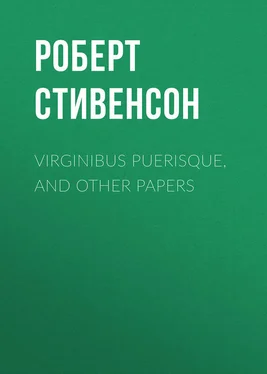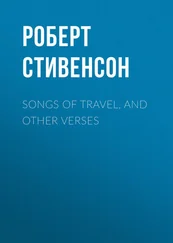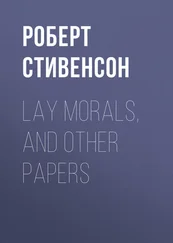Роберт Стивенсон - Virginibus Puerisque, and Other Papers
Здесь есть возможность читать онлайн «Роберт Стивенсон - Virginibus Puerisque, and Other Papers» — ознакомительный отрывок электронной книги совершенно бесплатно, а после прочтения отрывка купить полную версию. В некоторых случаях можно слушать аудио, скачать через торрент в формате fb2 и присутствует краткое содержание. Жанр: literature_19, foreign_antique, foreign_prose, на английском языке. Описание произведения, (предисловие) а так же отзывы посетителей доступны на портале библиотеки ЛибКат.
- Название:Virginibus Puerisque, and Other Papers
- Автор:
- Жанр:
- Год:неизвестен
- ISBN:нет данных
- Рейтинг книги:4 / 5. Голосов: 1
-
Избранное:Добавить в избранное
- Отзывы:
-
Ваша оценка:
- 80
- 1
- 2
- 3
- 4
- 5
Virginibus Puerisque, and Other Papers: краткое содержание, описание и аннотация
Предлагаем к чтению аннотацию, описание, краткое содержание или предисловие (зависит от того, что написал сам автор книги «Virginibus Puerisque, and Other Papers»). Если вы не нашли необходимую информацию о книге — напишите в комментариях, мы постараемся отыскать её.
Virginibus Puerisque, and Other Papers — читать онлайн ознакомительный отрывок
Ниже представлен текст книги, разбитый по страницам. Система сохранения места последней прочитанной страницы, позволяет с удобством читать онлайн бесплатно книгу «Virginibus Puerisque, and Other Papers», без необходимости каждый раз заново искать на чём Вы остановились. Поставьте закладку, и сможете в любой момент перейти на страницу, на которой закончили чтение.
Интервал:
Закладка:
I know a woman who, from some distaste or disability, could never so much as understand the meaning of the word politics , and has given up trying to distinguish Whigs from Tories; but take her on her own politics, ask her about other men or women and the chicanery of everyday existence – the rubs, the tricks, the vanities on which life turns – and you will not find many more shrewd, trenchant, and humorous. Nay, to make plainer what I have in mind, this same woman has a share of the higher and more poetical understanding, frank interest in things for their own sake, and enduring astonishment at the most common. She is not to be deceived by custom, or made to think a mystery solved when it is repeated. I have heard her say she could wonder herself crazy over the human eyebrow. Now in a world where most of us walk very contentedly in the little lit circle of their own reason, and have to be reminded of what lies without by specious and clamant exceptions – earthquakes, eruptions of Vesuvius, banjos floating in mid-air at a séance , and the like – a mind so fresh and unsophisticated is no despicable gift. I will own I think it a better sort of mind than goes necessarily with the clearest views on public business. It will wash. It will find something to say at an odd moment. It has in it the spring of pleasant and quaint fancies. Whereas I can imagine myself yawning all night long until my jaws ached and the tears came into my eyes, although my companion on the other side of the hearth held the most enlightened opinions on the franchise or the ballot.
The question of professions, in as far as they regard marriage, was only interesting to women until of late days, but it touches all of us now. Certainly, if I could help it, I would never marry a wife who wrote. The practice of letters is miserably harassing to the mind; and after an hour or two’s work, all the more human portion of the author is extinct; he will bully, backbite, and speak daggers. Music, I hear, is not much better. But painting, on the contrary, is often highly sedative; because so much of the labour, after your picture is once begun, is almost entirely manual, and of that skilled sort of manual labour which offers a continual series of successes, and so tickles a man, through his vanity, into good humour. Alas! in letters there is nothing of this sort. You may write as beautiful a hand as you will, you have always something else to think of, and cannot pause to notice your loops and flourishes; they are beside the mark, and the first law stationer could put you to the blush. Rousseau, indeed, made some account of penmanship, even made it a source of livelihood, when he copied out the Héloïse for dilettante ladies; and therein showed that strange eccentric prudence which guided him among so many thousand follies and insanities. It would be well for all of the genus irritabile thus to add something of skilled labour to intangible brain-work. To find the right word is so doubtful a success and lies so near to failure, that there is no satisfaction in a year of it; but we all know when we have formed a letter perfectly; and a stupid artist, right or wrong, is almost equally certain he has found a right tone or a right colour, or made a dexterous stroke with his brush. And, again, painters may work out of doors; and the fresh air, the deliberate seasons, and the “tranquillising influence” of the green earth, counterbalance the fever of thought, and keep them cool, placable, and prosaic.
A ship captain is a good man to marry if it is a marriage of love, for absences are a good influence in love and keep it bright and delicate; but he is just the worst man if the feeling is more pedestrian, as habit is too frequently torn open and the solder has never time to set. Men who fish, botanise, work with the turning-lathe, or gather sea-weeds, will make admirable husbands; and a little amateur painting in water-colour shows the innocent and quiet mind. Those who have a few intimates are to be avoided; while those who swim loose, who have their hat in their hand all along the street, who can number an infinity of acquaintances and are not chargeable with any one friend, promise an easy disposition and no rival to the wife’s influence. I will not say they are the best of men, but they are the stuff out of which adroit and capable women manufacture the best of husbands. It is to be noticed that those who have loved once or twice already are so much the better educated to a woman’s hand; the bright boy of fiction is an odd and most uncomfortable mixture of shyness and coarseness, and needs a deal of civilising. Lastly (and this is, perhaps, the golden rule), no woman should marry a teetotaller, or a man who does not smoke. It is not for nothing that this “ignoble tabagie,” as Michelet calls it, spreads over all the world. Michelet rails against it because it renders you happy apart from thought or work; to provident women this will seem no evil influence in married life. Whatever keeps a man in the front garden, whatever checks wandering fancy and all inordinate ambition, whatever makes for lounging and contentment, makes just so surely for domestic happiness.
These notes, if they amuse the reader at all, will probably amuse him more when he differs than when he agrees with them; at least they will do no harm, for nobody will follow my advice. But the last word is of more concern. Marriage is a step so grave and decisive that it attracts light-headed, variable men by its very awfulness. They have been so tried among the inconstant squalls and currents, so often sailed for islands in the air or lain becalmed with burning heart, that they will risk all for solid ground below their feet. Desperate pilots, they run their sea-sick, weary bark upon the dashing rocks. It seems as if marriage were the royal road through life, and realised, on the instant, what we have all dreamed on summer Sundays when the bells ring, or at night when we cannot sleep for the desire of living. They think it will sober and change them. Like those who join a brotherhood, they fancy it needs but an act to be out of the coil and clamour for ever. But this is a wile of the devil’s. To the end, spring winds will sow disquietude, passing faces leave a regret behind them, and the whole world keep calling and calling in their ears. For marriage is like life in this – that it is a field of battle, and not a bed of roses.
II
Hope, they say, deserts us at no period of our existence. From first to last, and in the face of smarting disillusions, we continue to expect good fortune, better health, and better conduct; and that so confidently, that we judge it needless to deserve them. I think it improbable that I shall ever write like Shakespeare, conduct an army like Hannibal, or distinguish myself like Marcus Aurelius in the paths of virtue; and yet I have my by-days, hope prompting, when I am very ready to believe that I shall combine all these various excellences in my own person, and go marching down to posterity with divine honours. There is nothing so monstrous but we can believe it of ourselves. About ourselves, about our aspirations and delinquencies, we have dwelt by choice in a delicious vagueness from our boyhood up. No one will have forgotten Tom Sawyer’s aspiration: “Ah, if he could only die temporarily !” Or, perhaps, better still, the inward resolution of the two pirates, that “so long as they remained in that business, their piracies should not again be sullied with the crime of stealing.” Here we recognise the thoughts of our boyhood; and our boyhood ceased – well, when? – not, I think, at twenty; nor, perhaps, altogether at twenty-five; nor yet at thirty; and possibly, to be quite frank, we are still in the thick of that arcadian period. For as the race of man, after centuries of civilisation, still keeps some traits of their barbarian fathers, so man the individual is not altogether quit of youth, when he is already old and honoured, and Lord Chancellor of England. We advance in years somewhat in the manner of an invading army in a barren land; the age that we have reached, as the phrase goes, we but hold with an outpost, and still keep open our communications with the extreme rear and first beginnings of the march. There is our true base; that is not only the beginning, but the perennial spring of our faculties; and grandfather William can retire upon occasion into the green enchanted forest of his boyhood.
Читать дальшеИнтервал:
Закладка:
Похожие книги на «Virginibus Puerisque, and Other Papers»
Представляем Вашему вниманию похожие книги на «Virginibus Puerisque, and Other Papers» списком для выбора. Мы отобрали схожую по названию и смыслу литературу в надежде предоставить читателям больше вариантов отыскать новые, интересные, ещё непрочитанные произведения.
Обсуждение, отзывы о книге «Virginibus Puerisque, and Other Papers» и просто собственные мнения читателей. Оставьте ваши комментарии, напишите, что Вы думаете о произведении, его смысле или главных героях. Укажите что конкретно понравилось, а что нет, и почему Вы так считаете.












